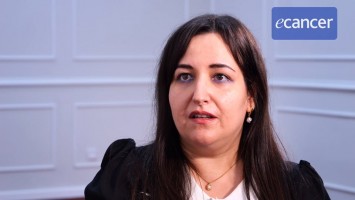What was your moderation about?
So my presentation was on liquid biopsies, the state of the field in oncology in general, mostly focused on thoracic oncology, where the assays are, when they can be used, what is the next step and the next frontier to cross.
Could you elaborate on the studies presented?
Absolutely. Now there’s a lot of focus on ctDNA specifically to monitor response to systemic therapy, and also ctDNA to detect what we call minimal residual disease. So what we’re trying to see is we know this is a biomarker testing that gives us prognostic information, so patients that do not clear their ctDNA, they have worse outcomes, they live shorter, they progress faster. So now the next step is, what if we can act on this biomarker and change therapy based on that? So, let’s say you’re giving your patients chemotherapy with immunotherapy, the guidelines tell us to give maintenance therapy for up to two years. But what if your patient cleared their ctDNA after six months or a year - do they really need the two years, or do they need to continue beyond two years? I think that’s the next step - how to personalise patient care using this biomarker that is in the clinic already.
Then, for the patients with resectable, curable disease, can we guide treatment after surgery based on this biomarker knowing who is high risk for disease recurrence and who is not.
What is the importance of having events such as BEST of ASCO?
This event is very good because it’s hard to go to ASCO and attend all the sessions, there’s a lot of information, it’s overwhelming for everyone. So having smaller meetings that just go over the highlights and get the message to more oncologists is key because if you don’t know the information you cannot change your practice, you cannot know what is the next step, you cannot engage with other colleagues. We help each other, so if you have someone’s contact as well, you can reach out. So, I think for patient care and also knowledge it is super important.








